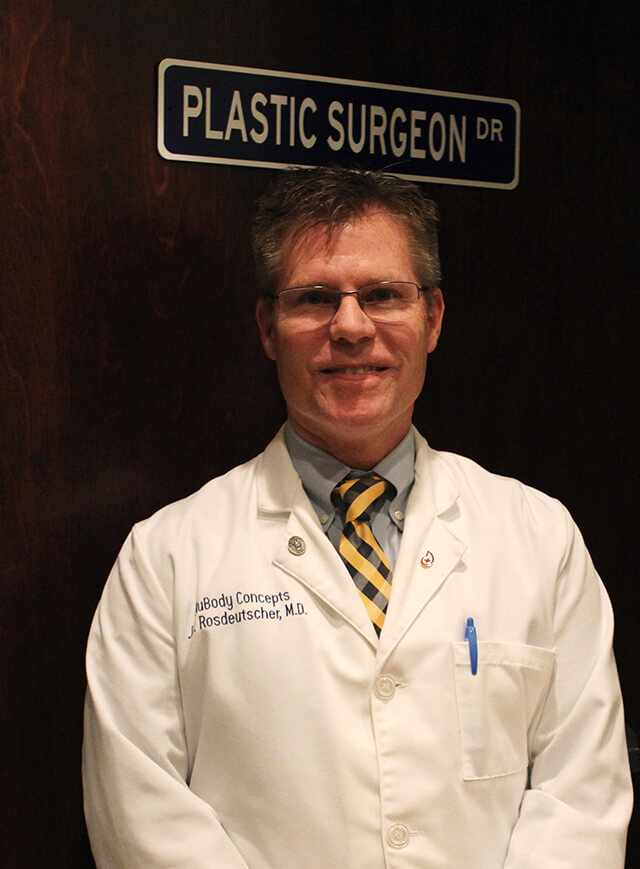When Dr. Rosdeutscher of NuBody Concepts Nashville recently sent me a note, followed by a dinosaur emoji, that he had just become the “last of his kind” in Middle Tennessee, I was intrigued. What kind?
When I called him to follow up, he told me this:
“I am the only double-board-certified plastic surgeon in Middle TN to be certified by both the American Board of Otolaryngology/Head and Neck Surgery and the American Board of Plastic Surgery.”
After a bit of back and forth – in part to get to the bottom of the correct spelling of the word “otolaryngology” – I expressed my surprise as to why this was such a rarity.
“Aaaah, you’ll now have to listen to the “The History of Otolaryngology in Plastic Surgery by Dr. John Rosdeutscher,” he told me. It turns out he is the author of an article on that subject in the June 2003 issue of Plastic and Reconstructive Surgery, the Journal of the American Society of Plastic Surgeons, adapted from a 2002 lecture he gave at Meharry Medical College in Nashville.
What follows is a summary of that story.
From the Battlefields of War
As so often with technological advance, the field of plastic surgery has its beginnings in war. More specifically, it was born in the trenches of World War I. Fighting had changed from swords to ballistics more or less at the same time as reliable anesthesia was developed, enabling soldiers to survive massive injuries to face and jaw that had previously proved lethal.
A mish-mash of field surgeons, orthopedists and ear/nose specialist found themselves confronted with the task of restoring these casualties, and their collective expertise eventually grew into the field of plastic surgery after World War II. Because of this early focus on the head and neck, it comes as no surprise that the field of plastic surgery was so heavily influenced by trained otolaryngologists.
Plastic Surgery and the Art of Connecting Tissue
The name plastic surgery has its origins in the Greek plastiko, which means to mold or form. All cosmetic surgery is essentially born out of reconstructive surgery performed on burn and other wounds. Form follows function.
A central skill early plastic surgeons had to master was the grafting of skin and connecting of tissue. In 1945, a French surgeon was the first to successfully graft a flap of skin from an identical twin to his brother, who had sustained severe burns in a grenade attack in Austria. It became clear that only the same or very similar tissue could be used in any kind of transplant.
The “Ultimate” Surgery
Due to this unique skill involved in connecting tissue, the field of plastic surgery laid the groundwork for several other medical disciplines. It was a plastic surgeon who performed the world’d first solid organ transplant. In 1954, Harvard-trained Dr. Joseph Murray performed a successful kidney transplant on identical twins. He was awarded the Nobel Prize in Medicine almost 40 years later for his discoveries in organ and cell transplantation.
One of plastic surgery’s most complex feats was the first long-term successful composite tissue transplant by American plastic surgeon Warren Breidenbach when he performed a hand transplant in 1999 in Louisville.
Similarly, cardiovascular surgery developed as an off-shoot of plastic surgery when plastic surgeons developed the skill of connecting the tiniest vessels and keeping the blood flowing. The same goes for oncology and reconstruction.
“When the other surgical specialists didn’t know what to do or needed rescue, they called plastics.”
When in Medical School, Dr. Rosdeutscher was drawn to plastic surgery because he saw it as the “ultimate surgery.” Plastic surgeons, perhaps contrary to popular belief, seemed to be among the best poised to handle difficult situations. “When the other surgical specialists didn’t know what to do or needed rescue, they called plastics,” he recalls.
Plastic Surgery and Otolaryngology
The American Board of Plastic Surgery was officially recognized in 1938 as a subsidiary of the American Board of Surgery, which represents general surgeons. If you train as a plastic surgeon in the United States, you generally enter a fellowship that follows a surgical residency. While otolaryngology is the oldest specialty that serves as a pathway to plastics – perhaps due to the interconnected history described earlier – there are now faster and easier pathways, such as facial plastics and even oral surgery.
This is why fewer and fewer plastic surgeons are trained in otolaryngology, and we’ve arrived, via a short excursion into the history of plastic surgery, at how it came to be that Dr. Rosdeutscher is now the only double board-certified plastic surgeon in Middle Tennessee who also has a board certification in otolaryngolgoy.
Operating on the Skin – And its Contents
But he wouldn’t have it any other way. His two board certifications are a daily reminder of how much influence both of his fields have had on medicine. He also likes to point out that of eight volumes of the plastic surgery “bible,” five are dedicated solely to the head and neck. So as a plastic surgeon, having been trained on the head and neck as a good surgical base is an excellent foundation for any kind of procedure. His favorite answer to those who write off cosmetic surgery as “just working on the skin is this:”
“Yes, we operate on the skin. And its contents.”
No two people are alike, everybody is a little different. And therefore, no procedure is routine. In the world of Dr. Rosdeutscher, every day continues to be a challenge, and he likes it that way.
If you are looking for plastic surgery in Nashville, please contact our Nashville Cosmetic Surgery Practice for a consultation. To schedule a consultation for plastic surgery in Memphis, please contact our Memphis Cosmetic Surgery Practice.
Dr. John Rosdeutscher is the Chief Medical Officer of NuBody Concepts who performs a wide range of plastic surgery procedures including liposuction, skin tightening, tummy tucks, breast augmentations (including breast lifts and reductions), facelifts, and mommy makeovers on patients in the Nashville area.

References: Plastic and Reconstructive Surgery, Volume 111, Number 7 (June 2003): The History of Otolaryngology in Plastic Surgery by John D. Rosdeutscher, M.D.












